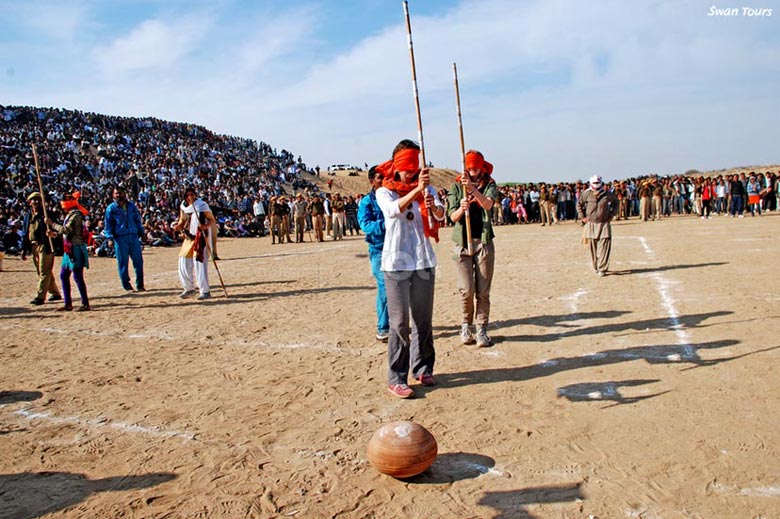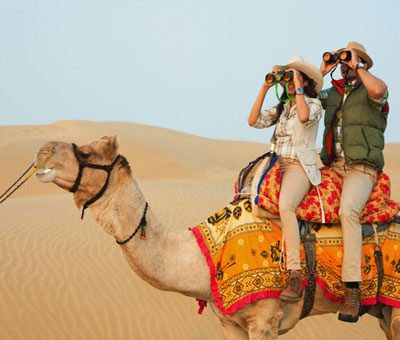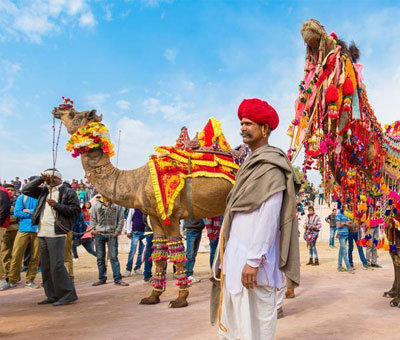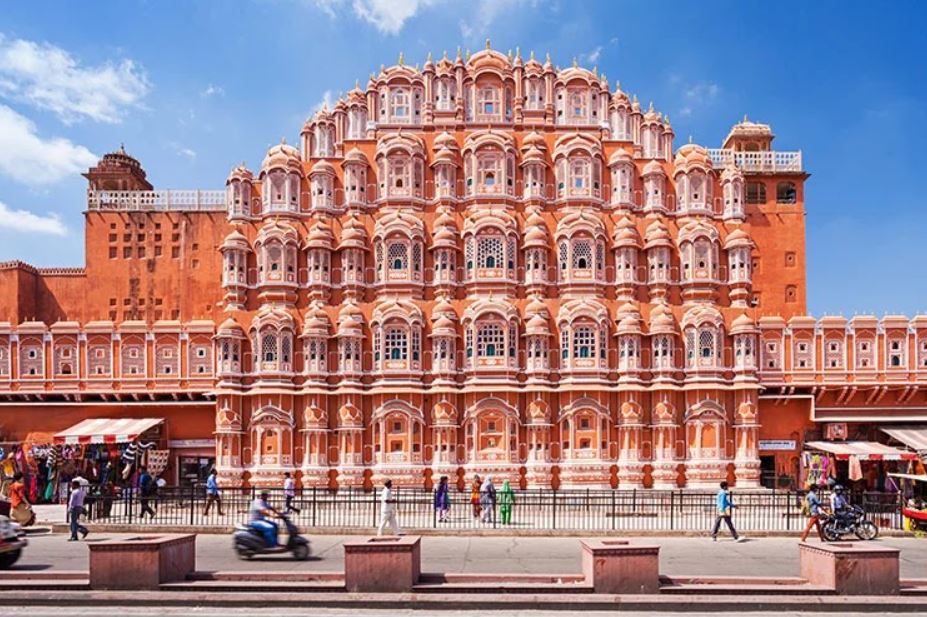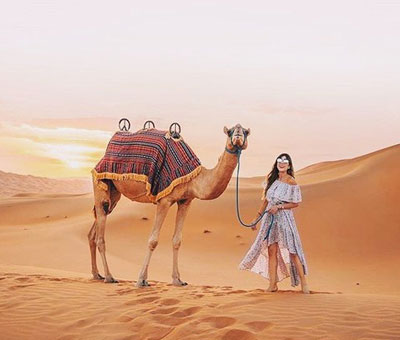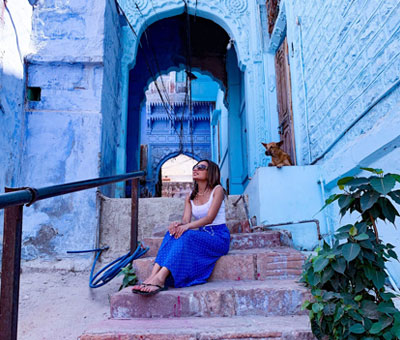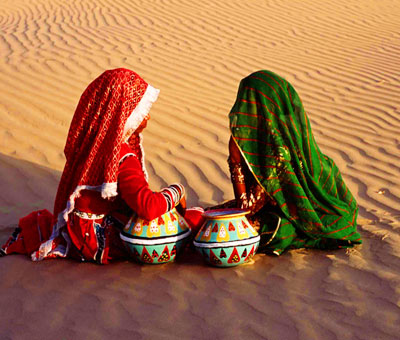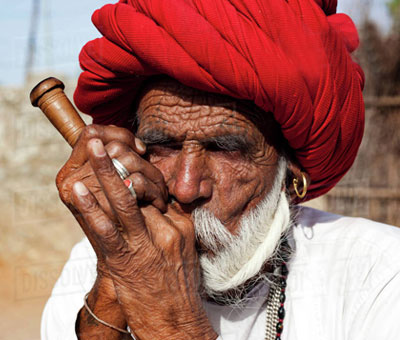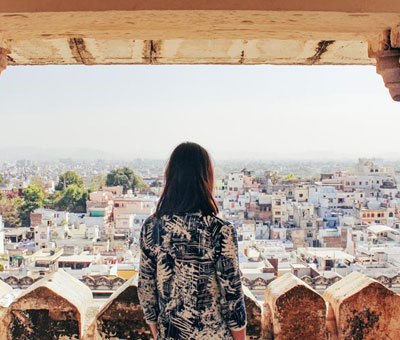Fairs and Festivals of Rajasthan
Rajasthan’s harsh climate makes it almost impossible to indulge in too many celebrations during the scorching summer, but once the monsoons bring a bit of relief, the state begins a round of celebrations that last well into winter and spring. A fiesta of sights, sounds and experiences, Rajasthan’s fairs and festivals are a riot of colours that are not to be missed!
Here is list of fairs/mela and festivals of Rajasthan:-
The Bikaner Festival in Rajasthan
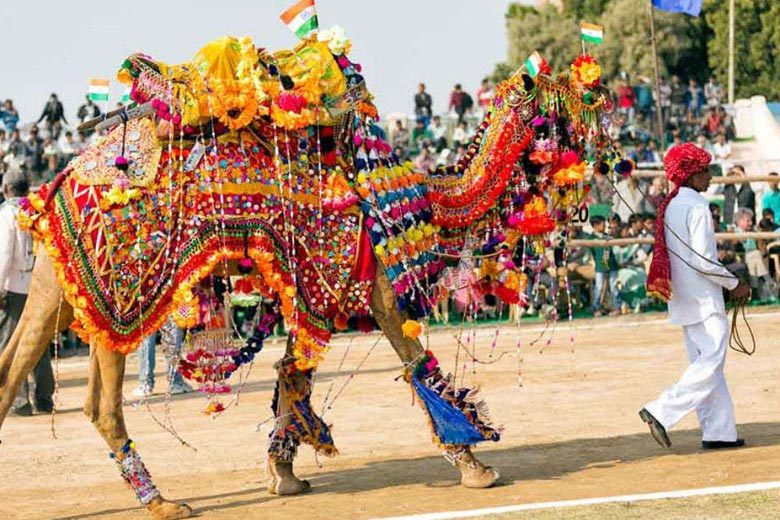
The Bikaner Festival
Every January, the desert town of Bikaner celebrates the Bikaner Festival, dedicated to the surly, hardy animal without which the desert would be incomplete — the camel. The festival opens with a parade of beautifully bedecked camels, and is followed by a number of events, including camel races and camel beauty pageants (let the least ugly camel win!). Camel traders and craftsmen from across Rajasthan also converge on Bikaner for the festival, and there’s plenty of scope for eating, shopping and photography.
Rajasthan Tour Packages
Pricing and Itinerary
Nagaur Fair in Rajasthan
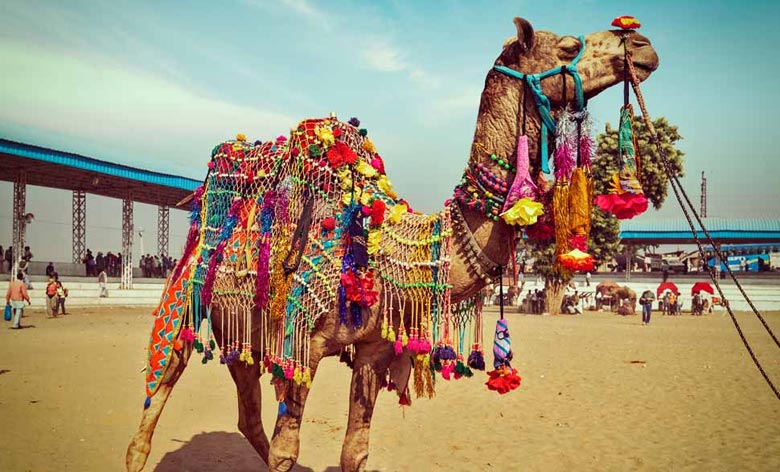
Nagaur Fair
India’s second largest cattle fair (the Pushkar Fair is the largest), the Nagaur Fair is held at the town of Nagaur at the start of the year — usually in January or February. The highlight of the fair is the local cattle: the Nagauri breed of bulls is particularly famous for being very swift, and buyers arrive from all across Rajasthan to purchase them. But fleet-footed bulls are not the only feature of the Nagaur Fair. Other attractions include horses and camels on sale, camel races, cockfights, tug-of-war contests, and folk music and dance performances, the latter usually held once the sun has set.
The most popular events that could be included as a part of Rajasthan Holiday Packages are as below:
The Baneshwar Fair in Rajasthan
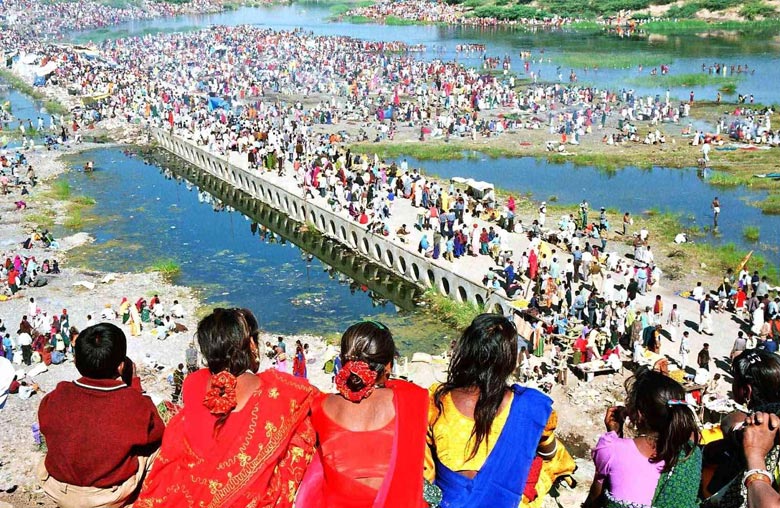
Baneshwar Fair Rajasthan
A tiny delta formed at the confluence of the Som and Mahi Rivers, in Dungarpur district, is the venue for the annual Baneshwar Fair, held in January or February every year, to coincide more or less with Shivratri- for the fair honours Shiv (known in the local dialect as `Baneshwar’, or ‘Lord of the Delta’). The fair is dominated by tribals (in particular Bhils), who congregate in vast numbers to offer prayers at the local temple of Baneshwar Mahadev, to sing folk songs, to gather around bonfires (a must on chilly desert nights!) and to enjoy a range of festivities, including magic shows, music and dance performances, animal shows and acrobatics.
The Desert Festival in Rajasthan
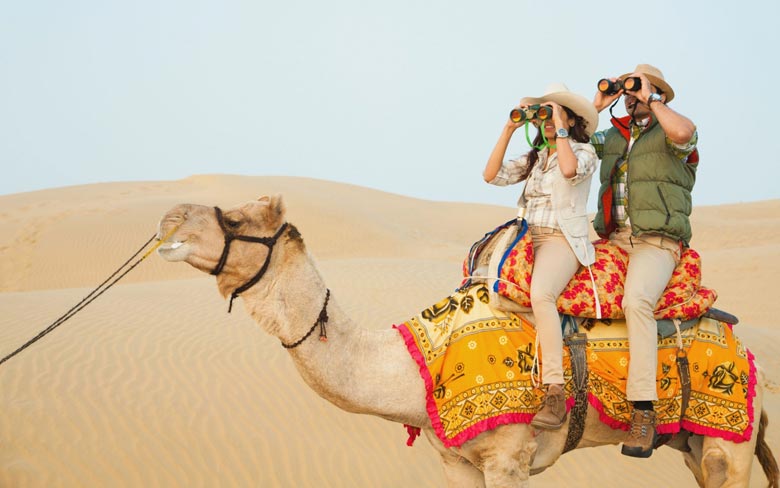
Desert Festival in Rajasthan
Jaisalmer hosts the Desert Festival in February, with a three-day long extravaganza of dances, music, handicraft fairs and interesting competitions — including really unusual ones like a ‘Mr Desert’ pageant, a ‘turban-tying’ contest and a ‘best moustache’ contest. Organized by the RTDC, the festival celebrates Rajasthan in a big way, with camel rides, processions, camel polo, and even a camel tug-of-war. All of it is held against the backdrop of the Jaisalmer fort, which is illuminated at night and is the venue for fireworks displays once the sun sets.
Elephant Festival in Rajasthan
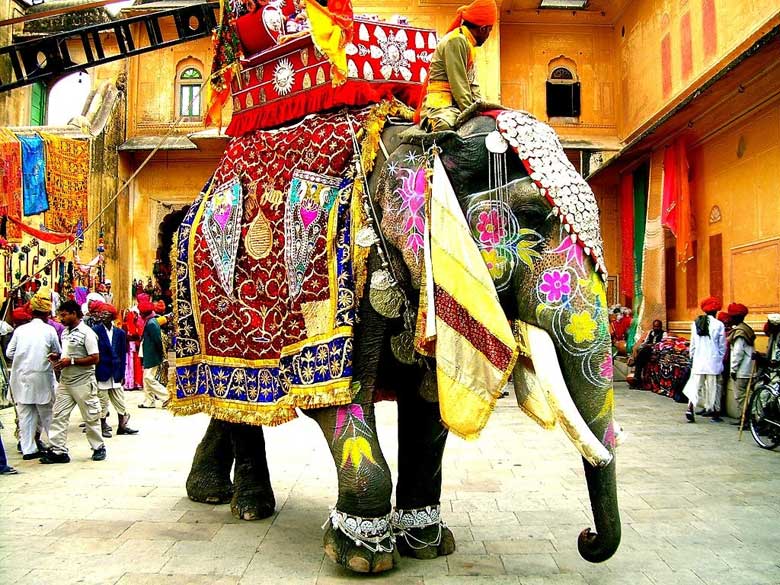
Elephant Festival in Rajasthan
Held in March at the state capital of Jaipur, the Elephant Festival is a pre-Holi bash that’s as colorful as it comes! The camel may be the most visible symbol of Rajasthan, but when it comes to Rajput royalty, the elephant wins hands down. So, the elephant it is — and that too in a daylong event (organized by the RTDC), which is held at the Chaugan stadium in Jaipur and attracts thousands of eager tourists. The festival starts with a procession of folk musicians and dancers, with richly caparisoned elephants marching along behind. This is followed by a ‘best decorated elephant’ competition, games of elephant polo, elephant races, a special ‘elephant decoration’ exhibition, and a tug-of-war between humans and an elephant. No prizes for guessing who wins! The festivities end with performances of folk dances; with a liberal splashing of Holi colours on all and sundry, and a spectacular display of fireworks.
Gangaur Festival in Rajasthan
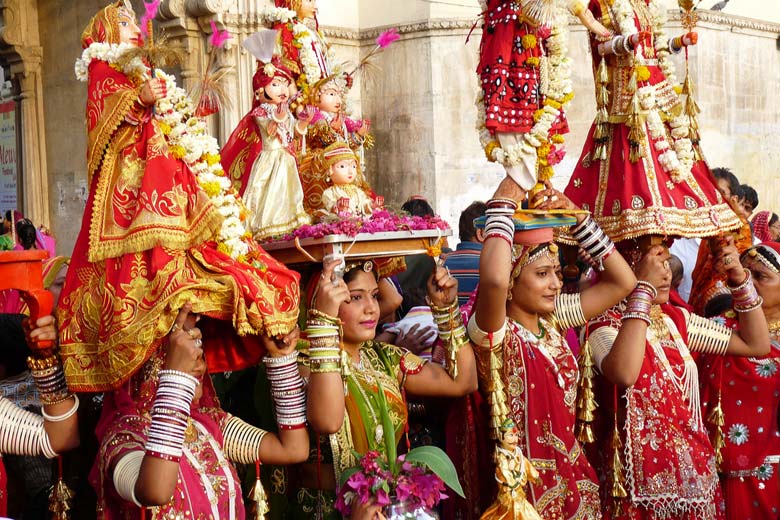
Festival of Gangaur in Rajasthan
One of Rajasthan’s most popular festivals, the spring festival of Gangaur (in April) is dedicated to the goddess of abundance, Gauri (Parvati). Gangaur is a largely female-centric festival, in that, most of the festivities and pujas are conducted by women. The fortnight leading up to Gangaur is marked by fasting and daily pujas, and on the day of the festival itself, a bejeweled and beautifully clothed idol of Gauri is the centerpiece of an elaborate procession. Gangaur is at its best in Udaipur (where a boat procession is held on the Pichola Lake), Jaipur, Jodhpur, Bikaner, Jaisalmer and Nathdwara. The Girasia tribals of the Sirohi-Mt Abu region celebrate Gangaur over more than a month, during which devotees carry decorated idols of Gauri from village to village, finally returning to their own village. During this period, single men and women of the tribe choose their mates and elope — a Gangaur custom that has prevailed through the ages.
Mewar Festival in Rajasthan
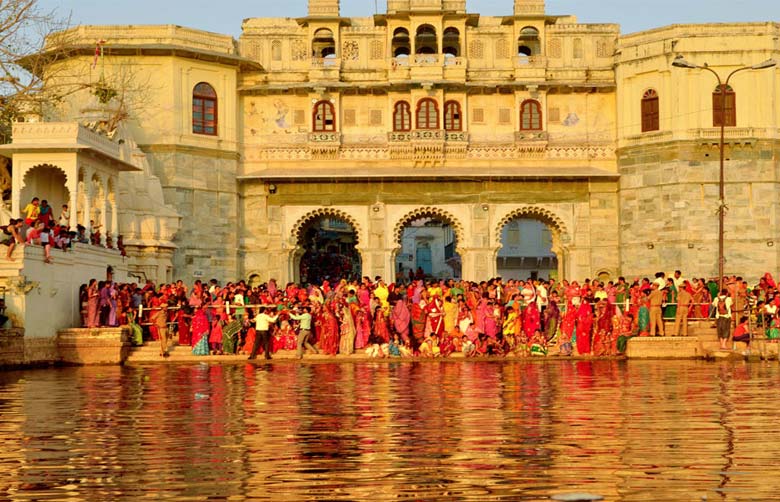
Mewar Festival in Rajasthan
Another of Rajasthan’s must-see festivals, the annual Mewar Festival is held at the former capital of Mewar, Udaipur. The Lake City’s beauty and its colourful cultural heritage form the basis for this exuberant festival, which is held in March or April to welcome spring. The Mewar Festival coincides with the traditional festival of Gangaur, and adds on more colour to it, in the form of folk songs, dances, fireworks, Gangaur processions and special concerts of devotional music.
Mount Abu Summer Festival
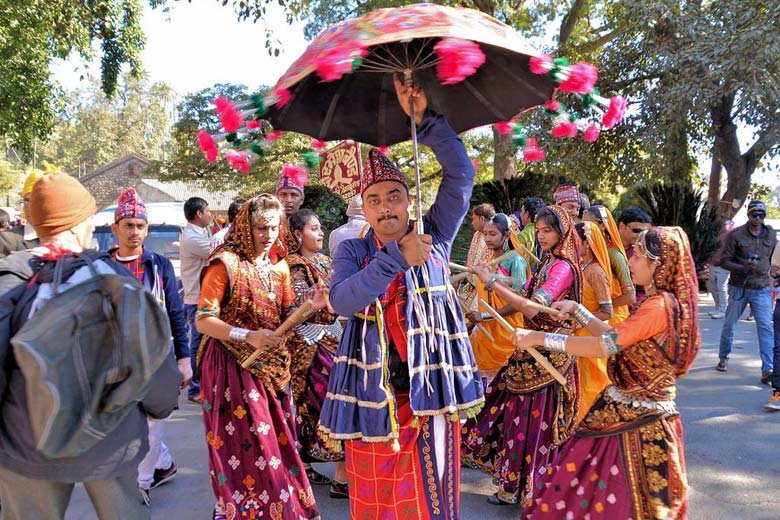
Mount Abu Summer Festival in Rajasthan
Possibly the only major festival of Rajasthan that is held during the summer months, the Mount Abu Summer Festival is a three-day event held in June. Folk dances, folk and classical music and a scintillating, sparkling whirligig of sounds, sights and colours characterize the festival, which begins with the singing of a traditional ballad, followed by performances of tribal dances, especially those of the Garasia tribals. Among the other highlights of the festival are a series of folk art performances, a boat race on the Nakki Lake, and a fabulous display of fireworks at night. In addition, there’s a highly entertaining evening concert of qawwaiis, which is extremely popular with those who come to attend the festival.
Teej Festival in Rajasthan
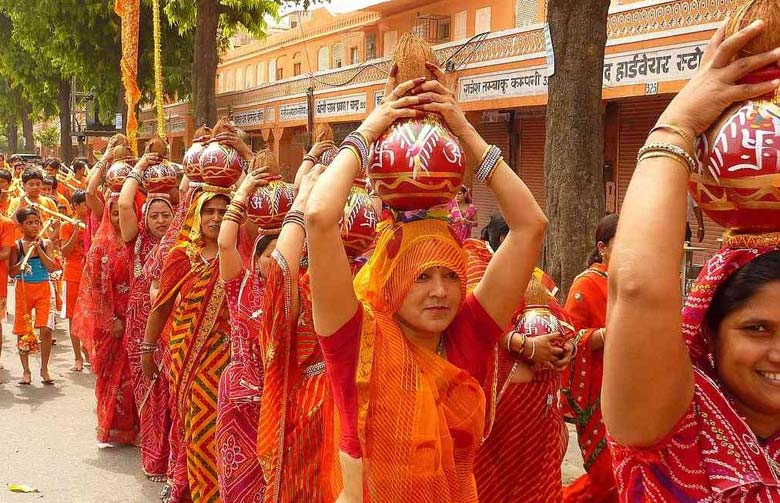
Teej Festival in Rajasthan
Although celebrated across northern India, the festival of Teej (in August) comes into its element in Rajasthan. Teej celebrates the arrival of the monsoon-undoubtedly a cause for celebration in such an arid land — and is observed by the donning of green clothing to symbolise the verdure of rain-fed fields. Teej is traditionally observed by women, who go their parents’ home for the festival. New clothes are worn, and women gather together to fast and to offer prayers to the goddess Parvati, whose devotion to her husband Shiva is considered exemplary. On Teej, an idol of the goddess, bedecked in red and gold clothing, is carried in a procession, accompanied by chanting and hymns. Simultaneously, Teej `tnelas or fairs are held at villages and towns, where thousands come to eat, drink, buy and sell. The celebrations include music and folk dances, as well as the hanging of swings from trees, where groups of women and girls gather to swing.
The Urs of Khwaja Moinuddin Chishti
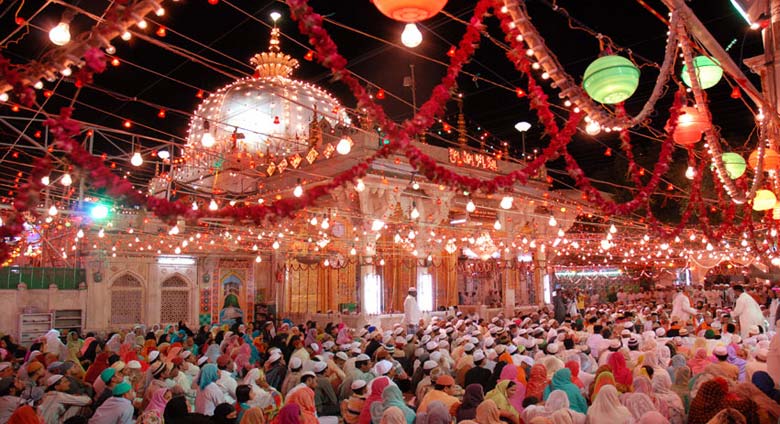
The Urs of Khwaja Moinuddin Chishti
The largest Muslim fair in India, the annual Urs of the Sufi saint Khwaja Moinuddin Chishti is held at the dargah of the saint in Ajmer, usually in May (sometimes as late as September). The six-day long Urs (the death anniversary of the saint) attracts thousands of pilgrims and commences with the hoisting of a white flag on the tomb by the Sajdanashin (successor-representative) of the Chishtia order. Over the following days, the tomb is ritually anointed with rosewater and sandalwood paste; qawwalis are sung and poetry recited in praise of the Almighty, prayers are said, and devotees offer nazranas or votive offerings. Outside the dargah precincts, two massive cauldrons cook sweet rice garnished with dry fruits and condiments to be served as `tabartikh’ or sanctified food. At the time of the Urs, a busy bazaar springs up at the foot of the dargah. Flowers, embroidered prayer rugs, prayer caps and decorative chadars are among the many things to he found in the bazaar, apart from the usual souvenirs.
Marwar Festival in Rajasthan
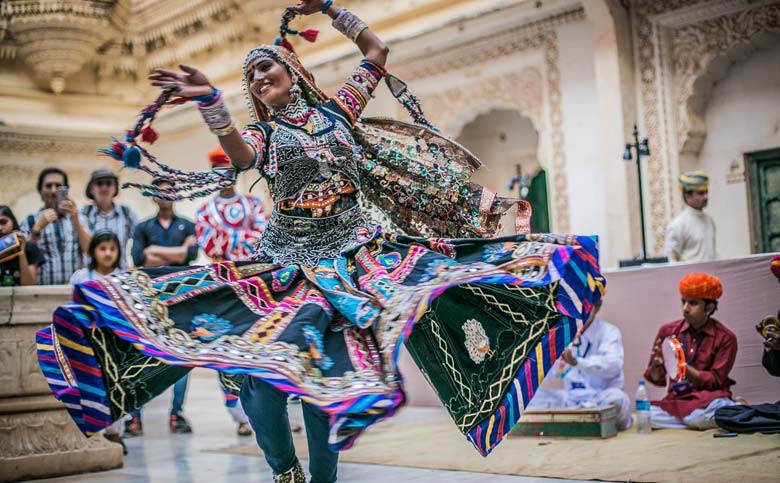
Marwar Festival in Rajasthan
Held in October at the wonderfully colourful city of Jodhpur, the Marwar Festival makes Jodhpur even more colourful. For two days, this indigo-tinted medieval city, once the capital of Marwar, becomes the venue for this spectacular fair, which celebrates the glory of Marwar-traditionally feting its valorous heroes, but today also a showcase for the arts and crafts of Rajasthan. Local Marwari dances and music, competitions of polo and horse riding and a grand finale of fire-dances on the sands of Osian, are the highlights of the festival.
Chandrabhaga Fair in Rajasthan
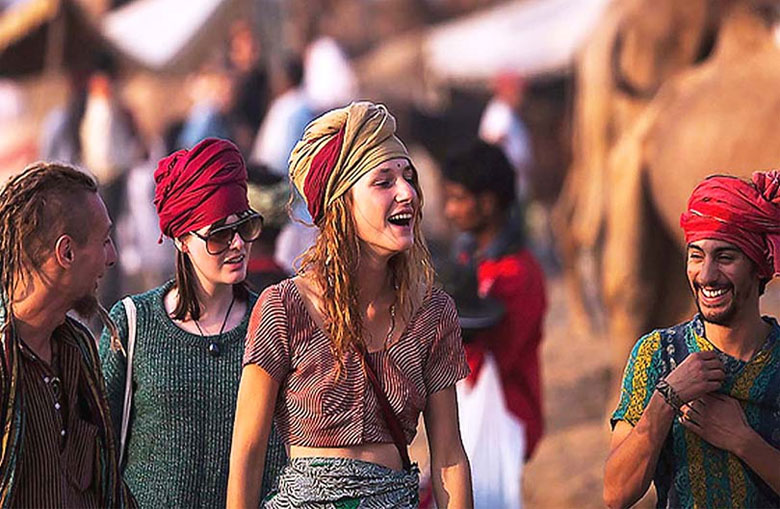
Chandrabhaga Fair in Rajasthan
The obscure little town of Jhalrapatan (near Jhalawar) comes into the limelight at the time of the Chandrabhaga Fair, which is generally held in October or November. Held on the banks of the sacred Chandrabhaga River, the fair attracts pilgrims who come here to take a dip in the river’s holy waters on the full moon night of Kartik Poornima. Simultaneously, a mammoth cattle fair is held at Jhalrapatan, with dozens of traders in cattle and camels converging on the town for the occasion. It’s a colourful if chaotic time, worth a visit if you happen to be in the vicinity.
Pushkar Mela in Rajasthan
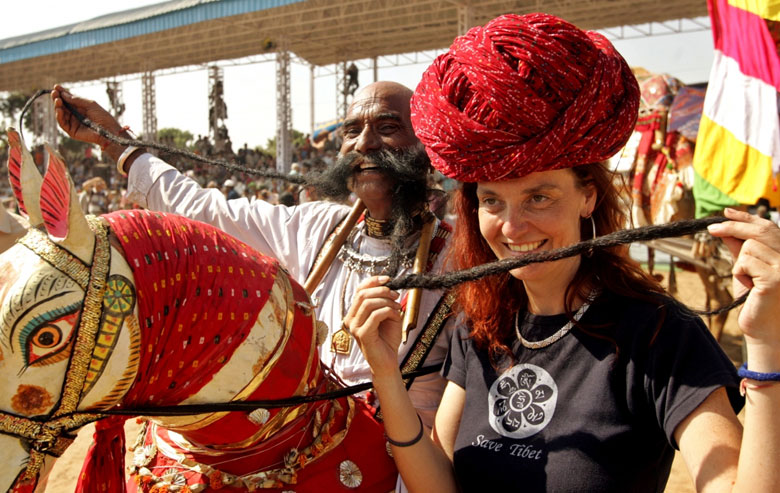
Pushkar Mela in Rajasthan
Usually held in November, the Pushkar Mela ranks as India’s- and perhaps the world’s-largest cattle fair. For the four-day long event, thousands of people-cattle traders, shopkeepers, merchants, dancers, musicians and artisans among them — congregate at the temple town of Pushkar. The fair is a memorable — and definitely overwhelming- cocktail of sights smells and sounds which bring together everything Rajasthani. For the period of the fair, Pushkar’s narrow lanes are the scene for hectic trade and barter, for merrymaking and rejoicing — and despite the fact that the increasing commercialization of the Mela has made it a whole lot more touristy than before, it continues to be a delightful experience.
For information on Travel packages to Rajasthan , Contact Swan Tours , One of the leading travel agents in India, promoting Rajasthan Tourism since 1995.
